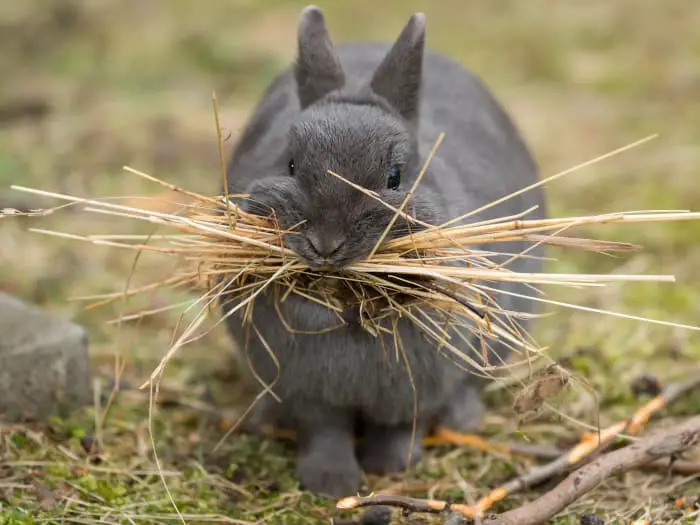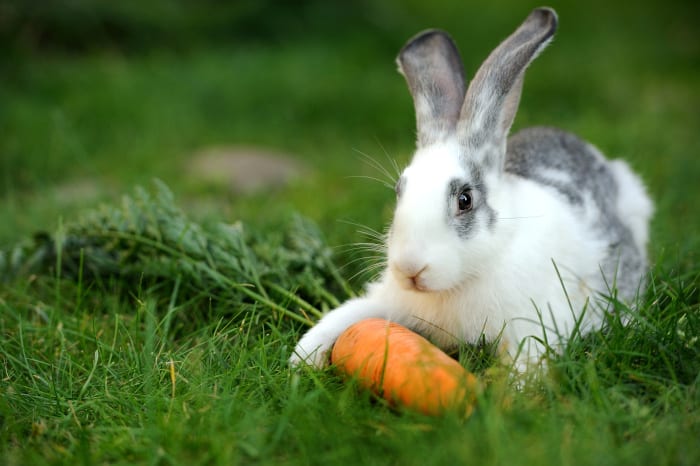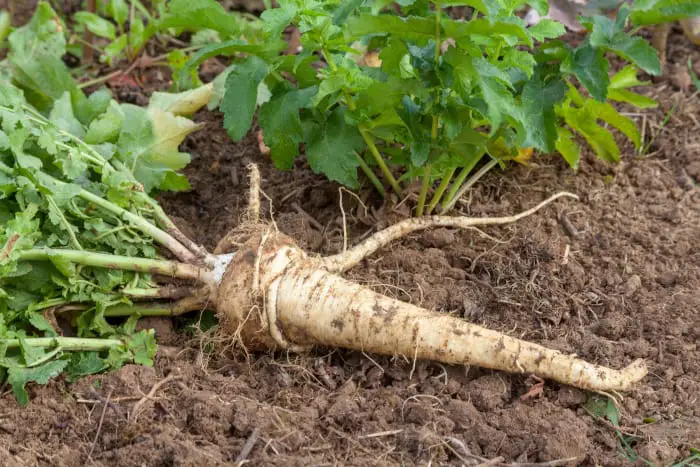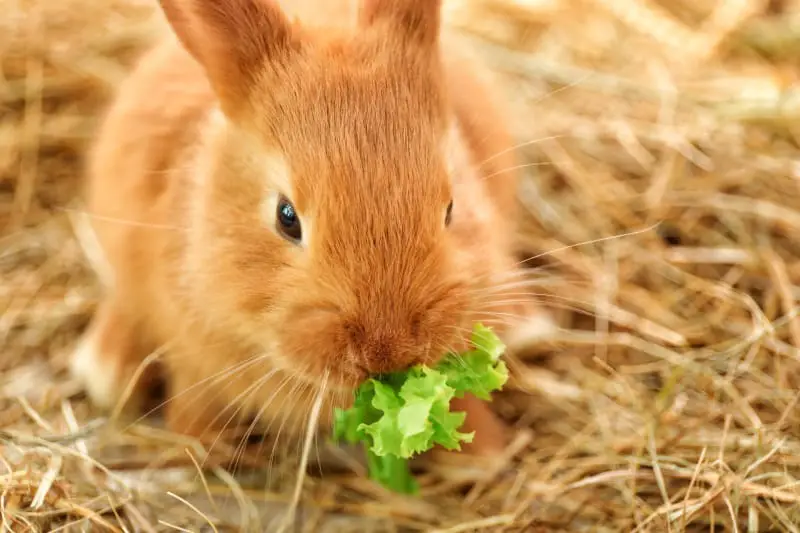If you have recently acquired a rabbit, what you feed him or her is particularly important, and you need to know which of the three diet categories your pet rabbit falls into. If you are not aware, animals fall into three categories when it comes to their diet. There are carnivores (meat-eaters), omnivores(consuming both meat and plant-based foods) and herbivores who eat only grass, plants, fruit and vegetables. It is critical to know exactly if pet rabbits are herbivores. So, you don’t make the mistake and offer your rabbit the wrong kind of food or shopping for the wrong items. Here we will discuss what category your pet rabbit belongs to and all the dietary tips that will help you keep your pet rabbit healthy.
Is my pet rabbit a herbivore?
The simple answer is yes, he certainly is a herbivore. Rabbits eat grass and other plant-based foods. A pet rabbit’s diet consists mainly of hay. It is recommended that you provide your rabbit with a limitless supply. In fact, it makes up 80% of what a rabbit consumes. Pet rabbits can eat some vegetables and fruits in small quantities, however not all fruits and vegetables are safe for bunny consumption.
How does my pet rabbit’s digestive system work?
As a herbivore, your pet rabbit digestive system is designed to move large amounts of plant material like hay through its digestive tract. Your bunny must eat large amounts of hay, vegetables and other plants in order to get nutrients to nourish its body. Since a rabbit is relatively small in size, it needs to move food through its system quickly. Intestinal blockages can make your pet rabbit sick or they may even be fatal in some cases.
What grasses and hays are safe for rabbit consumption?
As mentioned above grasses and hays make up most of a pet rabbits diet. Here is a comprehensive list of the grasses and hays that your rabbit can consume safely.
- Hays – Hay is made by grass that has been cut then dried to make feed for animals.
- Orchard Hay/Grass – This grass is high in fibre and aromatic. Your bunnies will love it.
- Timothy Hay – This hay is thick and coarse. It contains a mixture of stems and leaves from Timothy grass and it is recommended for pet rabbits with sensitive digestive systems due to its high fibre content and very little protein.
- Meadow Hay – It is comprised of a variety of different grasses. There may be sticks, other plants and other pieces of debris.
- Herbal Hay – This type of hay is blended with dried herbs and flowers to increase the nutritional value for your pet.
- Oat Hay – Pet Rabbits can use oat hay. It is often added for variety to your pet rabbits diet.
- Barn Dried Hay – This hay is dried by a machine that removes excess moisture.
- Barley Hay – It is made by cutting the barley in the early (milky stage) to make hay.
- Alfalfa Hay – We make mention of Alfalfa hay here even though it is not hay made from a grass. it is fact made out of legumes. It is extremely nutritious for your pet rabbit. It is high in protein and calcium. However, it should not be the main staple for an adult rabbit since alfalfa hay can be fattening.
- Grasses – They are just like hay, great sources of fibre that are essential for the digestive systems of rabbits. Grasses that have not been made into hay may retain more of their vitamins than their dehydrated counterparts. Below are the grasses that most pet owners gravitate towards.
- Bromegrass
- Bermudagrass
- Oat Grass
- Wheat Grass

Why do rabbits eat predominantly hay?
Hay is a non-negotiable for your pet rabbits. As herbivores, hay and grass are essential for a bunny’s good health.
Hay/Grass allows a pet rabbit’s digestive system to work properly. Bunnies eat hay all day long. This is why you must always have it available in their cages and hutches. The fibre that hay provides helps your pet rabbit’s gut function properly. It prevents blockages that could lead to GI Statis, which can be fatal.
Hay helps rabbits maintain their teeth. Rabbits teeth are continuously growing and grow about 12 cm per year, so the chewing on the hay grinds their teeth down to a reasonable size. Bunnies have 28 teeth, and if they keep on growing your pet rabbit may develop an abscess or the teeth may grow into the eye socket from within causing eye issues.
You can buy hay at your local pet shop or if you have access to a farm, you may be able to procure large amounts there.
What other plant-based foods do rabbits eat?
Pet rabbits can also have some amounts of fruits and vegetables. You can give them as treats or mixed in with hay, to give your pet rabbits some flavour variety. You can feed the following vegetables to your rabbit every day:
- Cucumber
- Endive
- Bell peppers
- Escarole
- Fennel
- Herbs, as you know, add flavour and that’s why your pet rabbits love it so much. These herbs are safe: rosemary, sage, thyme, basil, cilantro, dill, mint, oregano, parsley.
- Lettuces: Your rabbit will love these lettuces: romaine, bibb, arugula, buttered leaf, Boston, green leaf.
- Okra leaves
- Radish tops
- Sprouts: (alfalfa,clover,radish)
- Watercress
- Wheatgrass
- Zucchini
- Radicchio
- Bok choy
- Brussels sprouts
- Carrot tops
The following vegetables while your pet rabbit may love them have to be used sparingly since too much can cause digestive disruptions.
- Collard greens
- Dandelion greens (pesticide-free)
- Flowers: (daylily, honeysuckle, marigold, nasturtium, pansy, rose dianthus, English daisy, hibiscus, calendula, chamomile)
- Carrots
- Chard
- Clover
- Kale
- Spinach
- Broccoli (stems and leaves only)

Fruits should only be given as a treat. You should only give them to your pet rabbit twice one or twice a week. You can mix slivers in with their hay if you like. Most fruits have a high sugar content that can have an adverse effect on your bunny. Too much sugar in your pet rabbits diet can cause your pet rabbit to put on too much weight. Also, sugars may cause dental issues like tooth decay for your bunny. These fruits are excellent options if they are available in your country.
- Watermelon
- Pear
- Pineapple
- Grapes
- Melon
- Nectarine
- Orange
- Apple (no seeds)
- Banana
- Berries (strawberries, raspberries, cranberries, blueberries and blackberries)
- Cherries (no seeds)
- Papaya
- Peach
- Plum
Are there any plants that are toxic to my pet rabbit?
If you have a backyard your pet rabbit might sample what grows there and everything growing there may not be safe. The following is a list of the plants, vegetables and fruits that are poisonous for your rabbit:
- Macadamia Nut
- Tomato Plant
- Rhubarb Leaves
- Wild Carrots
- Almond
- Arum lily, you may also know them as a cuckoo point
- Bindweed
- Bracken
- Convolvulus also known as bindweed.
- Deadly nightshade, which you may know as belladonna.
- Delphinium is also known as larkspur.
- Fool’s parsley
- Foxglove
- Most evergreens
- Apple seeds (rest of the fruit in fine)
- Pear seeds
- Apricot (all parts except fruit)
- Onion
- Tomato leaves and vines
- Tulip bulb
- Wild Cucumbers
- Poppies
- Wild Parsnip
- Ragwort
- Wild peas
- Potato leaves
- Rhubarb leaves
- Woody nightshade
- Wild Carrots
- All plants that grow from bulbs
- Iceberg lettuce
- Avocado
- Eggplants
- Sweet potato leaves

Are pellets safe to feed my rabbit since they are not plants?
Yes, rabbit pellets are quite safe. Even though they are not plants per se, they are made from plants and they are a feed option that most pet owners use to supplement their pet rabbit’s nutrition. The following ingredients normally make up rabbit pellets:
- Hay
- Protein
- Calcium
- Vitamins
All of which are nutritious for your bunny.
Are wild rabbits carnivorous?
The answer is no. Rabbits are prey animals. While a rabbit may kill another rabbit in one of their fights. they will not eat each other or hunt other animals. It’s just not in their nature. Wild male rabbits are more prone to fighting each other to death. If you have fighting bunnies, you should separate them.
However, a doe may eat her young. If your rabbit eats her babies, it makes no sense trying to breed her again. She may revert to this habit if she has babies again. A doe may eat her baby if she is stressed or afraid. If she senses predators in the area, she may also eat her litter, and she may also eat one of her rabbits if it appears to be sick or injured. Also, she may consume the runt since she may sense he or she may not live. You should refrain from touching baby rabbits since the mother will smell your human scent on her baby and reject it, or worst she may kill it.
So, yes your pet rabbit is a herbivore, however your pet rabbit’s digestive system cannot tolerate all plants, vegetables and fruits. It would be wise to stick to hay and a small amount of the fruits and vegetables that are safe. The advantage of having a herbivore for a pet means his food is pretty accessible and some of his treats can come from your own kitchen. Your pet rabbit will be forever grateful that you know exactly what she should be fed.

